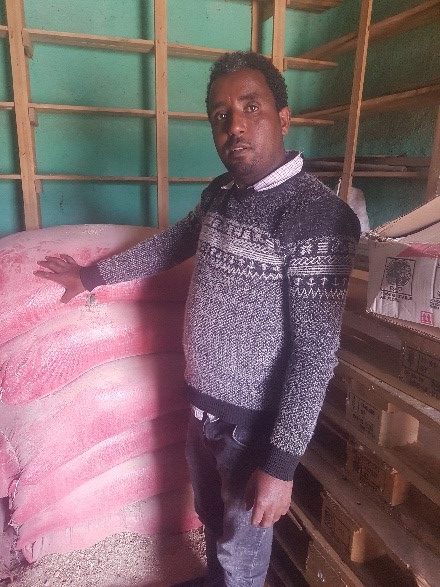Perseverance in the Time of COVID-19
The COVID-19 pandemic presents a devastating threat to lives and livelihoods around the world. Low-income households and communities in emerging markets are some of those most vulnerable to the pandemic’s social and economic shocks. These challenges knock on everyone’s door these days, including 30-year-old Tefera Lemi. Tefera is a beneficiary of the Feed the Future Ethiopia Value Chain Activity (VCA) and an agro-dealer/animal feed distributor in the Meraro Kebele, located in the Oromia Region. For Tefera, COVID-19 has meant fewer customers and sales due to movement restrictions and transport shortages.

Tefera studied animal science and rural development before taking jobs in the government and non-governmental organization sectors, where he spent many years working with communities. In 2018, Tefera decided to leverage his experiences in the agriculture sector and start his own agro-dealer business distributing animal feed, molasses, and masho feed for goat and sheep fattening. Over time, he was able to secure several loans from microfinancing and banking institutions valued between 50,000 and 150,000 Ethiopian birr. Now, Tefera typically sells around 138,000 kilograms of animal feed, 78,000 kilograms of molasses, and 2,400 kilograms of masho feed for sheep and goat fattening per year and nets an annual profit close to 200,000 birr. With his business, he is able to reach around 800 households in six Kebeles in Limubilbilo Woreda. His success has also allowed him to create job opportunities for two young men.

Disruptions in agricultural value chains and markets caused by the COVID-19 pandemic are severely affecting rural livelihoods, especially those of self-employed workers. Due to lockdowns and movement restrictions, smallholder farmers and agribusinesses, especially youth-run enterprises, are unable to sell their produce or access inputs, while seasonal and migrant workers are no longer generating income and need to return to their areas of origin, with ripple effects on their households. For Tefera, this has meant making adjustments to continue his business, but he is determined to not completely close his shop. Following advice from the Ethiopian Health Minister and government, such as washing hands frequently, wearing face masks, using sanitizer, keeping a safe distance from other people, and others, he looks forward to work each day and helping his community. Through VCA, Tefera received material support for his shop, including a ventilator to keep the room air conditioned and better store products, shelves to properly organize his goods, and assistance with ceiling repairs and paint to renovate his shop. Tefera appreciates the support he receives from VCA and remains determined to work hard and reach more individuals who are engaged in animal fattening: “For all people who come to my shop to get service, I will teach them about COVID-19 and how they can protect themselves from this epidemic because the majority of people around this area do not have knowledge about COVID-19.”
